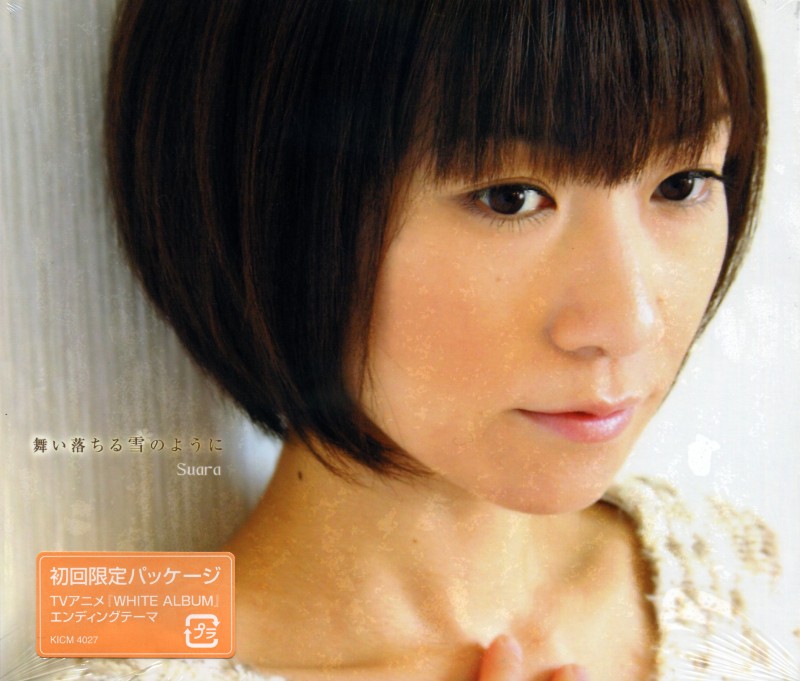White Album ED Single – Maiochiru Yuki no You ni – Review
| Album Title: | Maiochiru Yuki no You ni |
|---|---|
| Anime Title: | White Album |
| Artist: | Suara |
| Catalog Number: | KICM-4027 |
| Release Type: | OP/ED Single |
| Release Date: | Jan 28, 2009 |
| Track Title | Artist | Time |
|---|---|---|
| 1. Maiochiru Yuki no You ni | Suara | 4:53 |
| 2. Koi no Yokan | Nana Mizuki; Miki Watabe | 4:31 |
| 3. Maiochiru Yuki no You ni |
Nana Mizuki; Youhei Sugita | 4:53 |
| 4. Koi no Yokan |
Nana Mizuki; Miki Watabe | 4:31 |
Review: If there was ever a time where I’ve questioned my taste in music, listening to “Maiochiru Yuki no You ni” would qualify because this song has been described as being fairly bland and after going through it a few times, I’d have to concede that it’s true to an extent. For those of us who enjoy soft, mellow tracks, “Maiochiru Yuki no You ni” makes for a delightful listen in the way it conveys a sense of peacefulness and tranquility through Suara’s soothing voice, but otherwise, that’s about all it offers.
From the start, Suara breaks the stillness with her serene voice combined with the piano accompaniment which together, takes a rather gentle, mellow tone with a twinge of the melancholy thrown in. The soothing melody feels nostalgic as it brings forth memories of a winter morning from long ago where the snow is falling gently and the air is really still as the world is draped in a soft blanket of snow. It’s a serene image that fits well with Suara’s voice because of the way it draws you in without being particularly overbearing while the background instruments ease you along with the music’s flow through its euphonic rhythm. Beyond that, there isn’t much more to say because the tranquil feeling that this piece exudes is done really well and if you don’t mind slow-paced pieces, “Maiochiru Yuki no You ni” will be right up your alley.
“Koi no Yokan” contrasts with the previous track through its upbeat introduction which possesses a sort of energy that’s somewhat reminiscent of “Musou Uta.” In fact, it’s not a stretch to say that both songs are stylistically similar melodically. From the beginning, the upbeat introduction gives way to Suara’s staccato delivery that succeeds in conveying a sense of joy from having experienced love. This feeling of optimism in the beginning is tempered somewhat in the transitory section around 0:48 because the way she sings sounds as though she’s trying to keep her hopes from going so far to the point that it cannot be fulfilled. Finally, the chorus part comes in at 1:05 and here, this piece bursts forth and the melody continues to be joyful, though it’s definitely more guarded than before. I detect a bit of nervousness in her staccato delivery as though Suara feels some doubt creeping in, indicating that reality might have taken hold and that while she’s idealistic, it isn’t full blown like it was before. On the whole though, her enthusiasm is only dampened slightly as she conveys the sense of joy in her willingness to move forwards to explore this new relationship.
After writing this out, it’s become evident that both pieces have a sort of superficial quality to them that makes them enjoyable to listen to, but makes them woefully short in the depth of analysis that can be rendered. While this album is definitely worth checking out because the songs are fun to listen to and Suara’s performances are always solid, the shallow nature of the songs means that its staying power is somewhat suspect. So in the end, enjoy the melodies for what they’re worth, but don’t expect to remember much about it 6 months down the road.
Rating: Good
Ending – Maiochiru Yuki no You ni


To be honest I’m not really fond of Suara’s voice at all. It was the one thing about Kimikiss’s brilliant “Wasurenaide” that I didn’t like. I can’t really explain why I don’t like her. It’s like she’s a fat black lady in a crazed Baptist sermon (only, not black, not Baptist, and not in a crazed sermon), and I’m ready for her to start screaming with the OH LAWD AMEN YES OH MIGHTY LAWD.
On a more technical side, there’s some things I don’t find pleasing about this tune; for instance while the beginning progression goes I-V, but instead of just bringing it to vi they put in a iii-vi. I guess they could have just fiddled around with the phrasing to leave a half measure blank but….yeah. I should write a variation or something.
The organ is also kinda wtf.
@lelangir
That’s one hell of a 180-degree turn from her calm, tranquil fare that it’s hard to see how the descriptor you used applies to her. Especially when the music doesn’t have the sort of energy that one would associate with a stereotypical black, Baptist church.
If you had said that her tone of voice was soporific, I would have at least been able to see that 😛
Pingback:White Album Character Song 1 / Morikawa Yuki - Review | Anime Instrumentality Blog